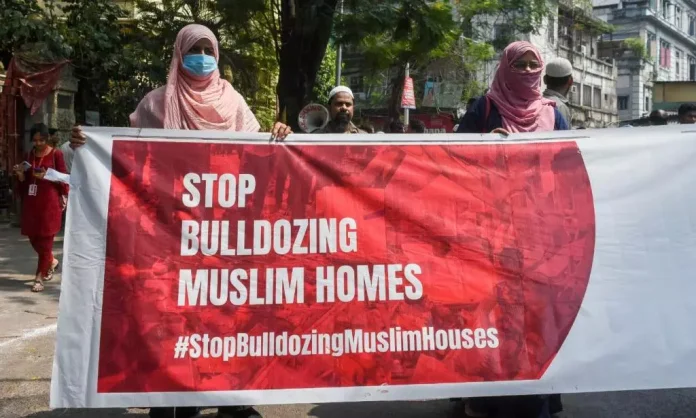New Delhi– A comprehensive investigation by The Wire, drawing on denunciations by international media, human rights organisations, academic groups, and Indian diaspora activists, warns of a coordinated campaign targeting Muslim citizens and undermining democratic institutions in India. The analysis collates reports from Nikkei Asia, Al Jazeera, The Washington Post, Financial Times, Human Rights Watch, Bellingcat–Alt News, TrialWatch, and others to highlight a troubling pattern of abuses allegedly linked to policies promoted by the ruling Bharatiya Janata Party (BJP) and Hindutva-aligned groups .
The timeline of concern covers July 1–31, 2025, during which the reports document deportation drives, electoral disenfranchisement, bulldozer demolitions of Muslim-owned houses, torture and custodial deaths, cross-border forced expulsion, media and judicial repression, and what critics call state facilitation of communal agendas .
Nikkei Asia reported India’s rejection of a binding 2020 ruling by the Permanent Court of Arbitration that had deemed its suspension of the Indus Water Treaty illegal — a move scholars say reflects growing trends among powerful states circumventing international law .
Al Jazeera focused on the Election Commission’s voter re‑registration drive in Bihar, warning that it appeared to serve as a covert mechanism for rolling out a National Register of Citizens (NRC), potentially disenfranchising millions—especially Muslim residents .
Meanwhile, The Washington Post documented mass deportations in Assam and Gujarat targeting individuals labelled “illegal immigrants” from Bangladesh — in many cases individuals and families who produced Indian identity documents and had voted in prior elections .
The reports also highlight widespread bulldozer demolitions, often conducted without judicial oversight, the confiscation of identity documents, and forced expulsions justified under national security rhetoric, frequently with tacit approval from local courts and officials .
A Financial Times profile traced the ideological escalation of the Rashtriya Swayamsevak Sangh (RSS), arguing it has evolved into the world’s largest far-right movement and now exerts deep influence over Indian state institutions, rooted in teachings eerily reminiscent of early 20th-century European fascism .
Investigative reporting by Bellingcat and Alt News uncovered violent cow-vigilante attacks on Muslim truck drivers in northern India. Human Rights Watch warned these attacks have been normalised within BJP-aligned public discourse. Historian Richard Eaton also raised alarm at systematic efforts to erase Mughal-era monuments and influence from public memory, framing it as politically motivated historical revisionism .
HRW further condemned the coercive deportation of Bengali Muslims, many of whom were later recertified as Indian citizens following international pressure and legal advocacy — underlining the failures of due process .
An academic-led study by TrialWatch, in collaboration with both Indian and U.S. universities, uncovered over 400 cases of criminal prosecution against journalists—many in smaller towns—revealing a disturbing pattern of judicial intimidation and legal harassment .
Global civil society has responded swiftly: activists shared prisoner testimonies and documentaries at film screenings across Europe, diaspora groups lobbied in the U.S. Capitol for designating India a violator of religious freedoms, and 31 diaspora organisations issued a joint statement denouncing the disappearance and torture of student protesters, which they described as part of a systematic crackdown on dissent and Muslim communities .
Critics described the cumulative effects of these developments as deeply erosive to democratic norms—viewing the month-long surge of state‑enabled repression as symptomatic of a broader, ideologically driven agenda. Observers contend India’s foundational commitment to constitutional rights and secularism is under dire stress unless swift course correction occurs.




